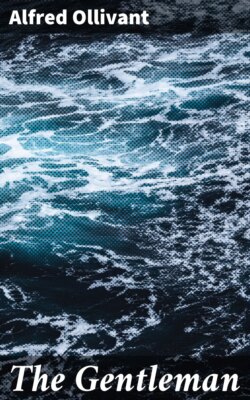Читать книгу The Gentleman - Alfred Ollivant - Страница 14
На сайте Литреса книга снята с продажи.
II
ОглавлениеThe colour of apple-blossom, coming and going in the lad's cheek, died away, and left him pale.
He was a splendid stripling, sun in his hair, sun in his eyes; with something of the lank grace of the fawn about him.
The face was fine almost to haggardness; with long chin, delicate nose, and eager eyes, very shy.
The boy had broken through the chrysalis of childhood, and not yet emerged into the fighting male. There was no down on his chin; the radiance of his cheek was yet undimmed. The soul, rosy behind its clouds, still tinged them with dawn-lights.
He was a Boy, sparkling Boy; Boy at the age when he is Woman, and Woman at her best, the playfellow, the tease, the inspiration; free of limb, as yet untrammelled of mind; with passionate hatreds and heroic adorations.
He was steering now, his eyes on the battered topsails in the mists before him; and in those eyes a glitter of swords. Had his mother or Gwen been there, they could have told from that frosty calm, those jealous-drooping lids, that Master Boy meant mischief.
And so it was.
This fat fellow with the heaving shoulders on the thwart before him, this chap with the crease across his bald neck, and the black sweat trickling from his hair, had insulted him.
As woman, he was bent upon revenge; as man, he would go warily, striking only to strike home.
"That was a fine horse you flogged to death," he began tranquilly, trailing his fingers in the dead green waters.
"Yes, sir," panted the other, thrusting at the oars. "I don't spare spur when I'm ridin agin the French. I'm a man, and an Englishman—not a pink-faced, girl-eyed booby togged out in a cocked hat and a tin dagger, calling meself a King's officer."
"I guessed that you were not one of us," replied the boy delicately. "Your manners are too distinguished. But tell me a little more about your ride. You seemed in rather a hurry. I take it you were riding for a drink."
The great man swung round. His whole life seemed to have stopped short, and now hung behind his eyes—an appalling shadow.
For one swift moment the boy thought he would be struck.
Then the big man spoke; and his voice was measured and very still.
"If you think I burst the gamest eart that ever beat in an orse's ide for a drink, why then, sir," with crushing simplicity, "you think wrong."
He resumed his rowing, and continued with the same surprising dignity.
"I bred that orse; I broke that orse; I loved that orse."
The tide of the boy's being set back with a shock.
"O!" he cried. "O … I didn't mean … I really. … "
"That's all right, sir," came the other's smothered voice. "I know you didn't."
He swallowed, and his face grew rigid. Then a light broke all about it.
"But there!" with husky pride. "He won't bear me no grudge—will you, old man?" with a hoarse burst of tenderness, flinging his arm towards the bank, where the dead horse's girths glimmered still in the dusk. "He know'd I wouldn't have asked it of him, only I had to. That's my old orse! that's my Robin!—Never asked no questions. Just took and died and did his duty without the talkin. Maybe some of us might learn a bit from him."
Taking a great bandana from his pocket, he blew his nose like the report of a pistol.
"A'ter all," he said, with touching solemnity, "he died for his country, did my Robin—same as Abercromby at Alexandrya."
